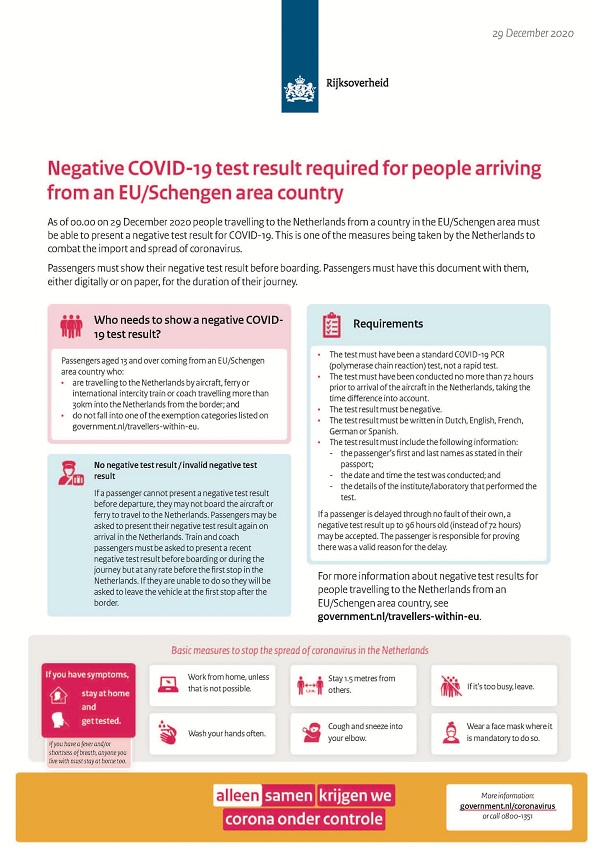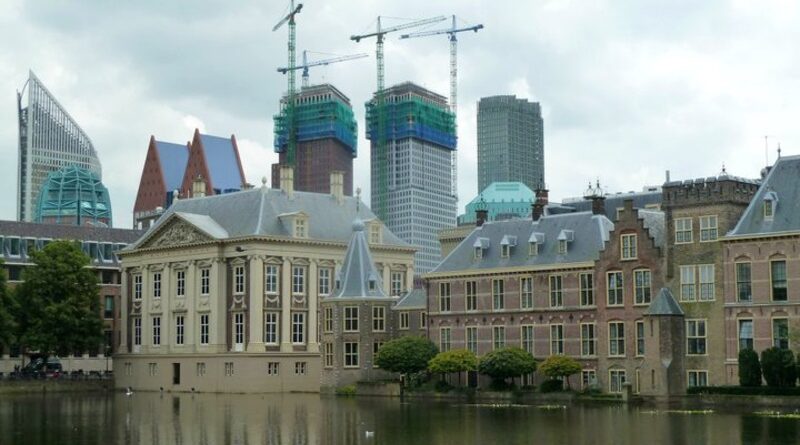The Netherlands’ Bizarre Corona Travel Restrictions
The Netherlands has changed its corona travel restrictions to include compulsory PCR testing, although there are so many bizarre exemptions and inconsistencies that it will boggle your mind.
PCR test requirement
As I already wrote a few days earlier, the Dutch Government has changed its corona travel restrictions by introducing a PCR test requirement. This requirement counts for all passengers flying to the Netherlands – including those who are just transiting through the country and are only changing flights at Amsterdam Airport.
Needless to say, this sudden policy change has left hundreds of people stranded across the world as they suddenly required a negative PCR test certificate in order to board their flight home.
If you would for example fly from Stockholm to Zanzibar with KLM, you would now need to produce a negative PCR test on both the outbound journey to the Tanzanian paradise island, as well as on your return home – even when you wouldn’t actually set foot outside of the airport in Amsterdam!
Leaving aside the hassle (or at times sheer impossibility) to get such a PCR test on time in some countries, the costs also add up. If you are a family of four and need to pay $100 for a PCR test, you suddenly might need to cough up 800 USD extra for your trip even though your home country as well as your destination don’t require such PCR tests.
You only have to get them just because you are unfortunate enough to fly KLM through the Netherlands!

Court case
Given how quickly the Dutch Government passed the new measures and how sketchy the legal basis is, I was already wondering when someone would challenge the PCR test requirement in court.
And indeed, one family which found themselves in Zanzibar has now challenged the government decision in court. In an emergency court hearing, the judge sided with the Dutch family and ruled that the PCR test requirement has no legal basis.
The judge said: “Introducing such a requirement for citizens of the Netherlands who want to return home requires legal grounding, and this is not covered by article 53 or 54 of the public health act.”
In its ruling, the judge said that de-facto forcing a Dutch citizen to have a PCR test before being able to return home goes against a person’s physical integrity which “requires a concrete legal basis”.
Consequences
Although the ruling means that case law has been established, it doesn’t mean that the PCR test requirement has disappeared overnight. If you go to the airport with the court ruling in hand but without a negative PCR test, you will probably have a hard time explaining the gate agent to allow you to board.
The judge said that while the Dutch family must be allowed to fly home, the ruling only counts for this family alone. A court spokesman added that “the ruling does not mean that everyone abroad can show the verdict and doesn’t require a test anymore”.
That said, the ruling will make it easier for other people to challenge the Dutch Government in court given that future cases are very likely have the same outcome now case law has been established.
Yet as long as the Dutch Government doesn’t actually amend or withdraw the law, the negative PCR test requirement is still in place.

Other inconsistencies
If you think that this is all a hot mess for the Dutch Government, then you’d be surprised that this is only the beginning. If you look at the official travel restrictions and measures on the government website, there are dozens of weird, inconsistent and arbitrary rules.
Although it is relatively clear what the corona restrictions are for those flying to the Netherlands, it is absolutely unclear when it comes to those travelling overland. I have no other words to describe these measures as being completely bizarre.

Transport mode
According to the government website, you have to provide a negative PCR test certificate if you are travelling to the Netherlands by sea. What I heard, this is indeed enforced in UK ports as you are not allowed to embark without showing a negative test.
It however gets plain weird when looking at the land borders. The government website says that “passengers are required to present a negative COVID-19 test result and declaration if they are (..) travelling by international intercity or coach”.
So you need a negative PCR test if you travel by intercity train, but do not require one when you cross the border with a slow train. For example, taking the ICE high speed train between Duisburg (Germany) and Amsterdam means you have to provide a negative PCR test, but when you first take the regional train from Duisburg to Arnhem and change there for Amsterdam, you won’t.
Same when it comes to travelling by road. Booked a ticket on a bus? Bad luck, you need a test! Travelling by car or walking across the border? You don’t need a PCR test!
Because as we all know, the corona virus spreads more easily in intercity trains as opposed to regional trains. It is omnipotent with coach passengers, but not among people travelling by car. Or something like that. (/sarcasm mode off)
Needless to say, all of this is barely enforced at all. Dutch newspaper ‘Volkskrant’ wrote that international passengers are “barely checked at all” when travelling by train or bus into the Netherlands (link in Dutch only). Of course, given the fact that there are no border checks between the Netherlands and Belgium and Germany because they are all part of the Schengen Zone plays a role here too.

Distance
If you think that is weird enough, then look at another exemption listed on the government website. A PCR test is again needed if you venture inland more than 30 kilometres from the border, but not in the areas within 30 kilometres from Belgium or Germany.
I understand why this measure is taken given that there is a huge amount of trans-border traffic, with people for example living in Belgian border towns but working in the Netherlands or vice versa.
But if the goal is to protect public health, why did the Dutch Government come up with this restriction? It basically means that inland cities far away from the border like Amsterdam need to be protected at all costs by demanding a negative PCR test, while there somehow is no public safety risk for a foreigner to visit cities near the border like Maastricht, Enschede or Venlo?
Wouldn’t it be just a lot more simple to say that everyone needs a corona test no matter where you are travelling to in the Netherlands, but list trans-border workers and such people as exempted categories in your travel restrictions?
I also wonder whether this requirement could be unconstitutional too. After all, the government just drew an imaginary “PCR test border” 30 kilometres inland from the actual border. Shouldn’t Dutch cities and their citizens be treated the same according to the law?

Loopholes
Needless to say, this whole hot mess of contradicting travel restrictions creates a lot of loopholes. If you have to visit the Netherlands but are not able to take a PCR test in time, why not fly to Bremen or Brussels or whatever city in Belgium or Germany, and take a slow train (not an intercity!) from there across the border?
After all, you would do nothing illegal – you are just following the rules according to the letter of the law.
In the end, there are two categories of people who lose out. First of all it’s the international traveller, having to deal with a set of bizarre restrictions, and second, the Dutch citizens, given that all these laws still have no effect whatsoever on public health or slowing down corona infection rates.

In short
Although there are several more countries in the world with weird corona rules – take the UK for example where you could only drink a pint of beer in the pub when you order a “substantial meal” of Scotch Eggs with it – the Netherlands is taking the top award.
The corona travel restrictions set by the Dutch Government do not only lack a legal basis, but they are just plain weird and inexplicable in the first place.
So you can drive into the Netherlands by car or bike without any restrictions, but if you go by bus or intercity train or coach you would require a negative corona test. Travelling by slow, regional train instead of an intercity train? Then you are fine again!
I’m also highly curious whether it is actually constitutional to allow travellers into the border area without a negative PCR test, but to suddenly require one when they venture more than 30 kilometres inland.
Let’s hope that the Dutch Government quickly amends or withdraws these new set of corona travel restrictions as they are a hot mess for both Dutch citizens as well as for foreigners wishing to visit the Netherlands.
UPDATE 4-1-2021: The Dutch Government has issued a statement that it intends to retain the PCR test requirement for all incoming flight passengers, including those who transit through a Dutch airport. It will appeal the court decision and to be on the safe side will add the PCR test requirement to a COVID-19 emergency decree, which according to them would fulfil all legal requirements. To be continued..!

